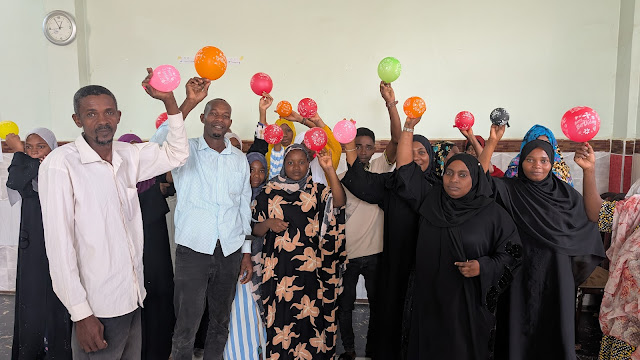BY
KHELEF NASSOR@ZANZIBAR
Peace is more than the absence of conflict; it is
a state of harmony where communities live with respect, understanding, and
cooperation. True peace creates an environment where individuals can thrive,
families grow strong, and societies progress. However, peace is fragile and
must be actively nurtured by all members of society.
Women and youth play a critical role in building
and sustaining peace. They are not only the majority of many communities but
also agents of change, innovation, and resilience. When empowered with
knowledge and leadership skills, they become vital contributors to conflict
prevention, social cohesion, and community development. Their involvement
ensures that peace is inclusive, representative, and sustainable.
Recognizing this, Norwegian Church Aid
- NCA recently organized a comprehensive three-day training program
focused on leadership and peacebuilding for women and youth in Pemba Island.
The training was part of the broader project “Championing Interfaith Approaches
for Women and Youth Empowerment for Peaceful Coexistence along the Swahili
Coast of Tanzania” popularly known as Swahili Coast Project, which aims to
strengthen community resilience and promote peaceful coexistence along the
Swahili Coast of Tanzania. Funded by the Royal Norwegian Embassy, the
project embraces interfaith dialogue and inclusive community empowerment as
tools to prevent violent extremism. The training was held at Samael Hall
in Chake Chake, Pemba.
The training gathered participants from the four
districts of Pemba: Mkoani, Chake-Chake, Wete, and Micheweni. It provided an
interactive learning environment where women and youth gained practical skills
in conflict management, mediation, and leadership in their communities.
During the official opening of the training, Ms.
Doreen Bwogi, Project Coordinator from NCA, explained that the organization
believes community empowerment is the best way to build lasting peace. She also
stated that the Swahili Coast project aims to strengthen community resilience
by bringing together women and youth from different religious and ideological
backgrounds to learn and collaborate.
“We believe that when youth and women are given
the right opportunities and skills, they can become catalysts for peace and
harmony in their communities. This training is part of our efforts to invest in
tomorrow’s leaders,” said Ms. Doreen.
The training was facilitated by Mr. Khelef
Nassor, NCA’s Program Assistant, who guided participants through
dynamic and interactive sessions. With a strong focus on participation, he led
exercises that encouraged critical reflection, dialogue, and practical
application of leadership and peacebuilding concepts within community settings.
“We used the Common Ground Approach to
help participants move beyond surface-level differences and recognize what
unites them as members of the same community,” said Mr. Nassor. “It was
inspiring to see young people and women begin to view themselves not just as
passive observers, but as active contributors to peace.”
Mr. Nassor stressed that building peace begins with individual self-awareness and the ability to listen with empathy. He explained that peace is not passive, it demands deliberate action to break down harmful stereotypes, promote inclusion, and build trust within communities. According to Mr. Nassor, recognizing personal biases, appreciating diverse viewpoints, and maintaining respectful dialogue even in disagreement are all essential. In a place like Pemba, where social ties run deep and traditions are valued, he noted that peacebuilding is both a personal responsibility and a collective duty.
A facilitator leads a session on peacebuilding and
conflict transformation during the training at Samael Hall, Chake Chake, Pemba
For women participants, the training created space
for deep reflection and dialogue around the challenges they face and the roles
they can play in peacebuilding at home and in their communities. Many of them
shared personal stories about conflict and reconciliation, while also exploring
leadership in a safe and empowering environment. “I used to believe
that peacebuilding is something only men or leaders do,” Adhra Hamad,
a participant from Micheweni. “But this training showed me that even at
home, in the market, or at a community meeting, I have the power to influence
peace.”
On the other hand, Sabrina Ali said that he
learned how to engage in dialogue, understand others’ perspectives, and take
the initiative in resolving tension peacefully. “We are the future,
yes but we are also the present,” said Hamadi, a youth
participant from Chake Chake. “If we wait to be given space, it may
never come. This training has taught me to start where I am and build peace
step by step”
Also, the participant acknowledges that the
training helped them identify early warning signs of conflict and understand
their responsibility in maintaining social harmony. “Before this
training, I didn’t know how to recognize the signs of rising conflict,” Khatibu
Mtawa, a bodaboda rider from Micheweni. “Now I can spot small
things like changes in behavior, tension in conversations, or unfamiliar
people spreading harmful messages. I’ve realized that how I respond can make a
big difference.”
Over the course of the three days, participants,
built trust and connections and they concluded the training with renewed
commitment and concrete plans to apply what they learned in their daily lives,
becoming catalysts for peaceful change.
Through this initiative, NCA demonstrates the
power of community-led approaches to peacebuilding. By investing in women and
youth, they help lay the foundation for resilient, peaceful societies in Pemba
and Zanzibar as a whole.
The “Championing Interfaith Approaches for Women and Youth Empowerment for Peaceful Coexistence along the Swahili Coast of Tanzania: project - Swahili Coast project is implemented by Norwegian Church Aid Tanzania and funded by the Royal Norwegian Embassy. The project aims to strengthen community resilience and promote peaceful coexistence across Southern Tanzania by placing women and youth at the center of peacebuilding efforts. Through interfaith dialogue, inclusive training, and community-led initiatives, the project fosters mutual understanding and collaboration among people from diverse religious and cultural backgrounds.
Training participants engaged in group work during a conflict analysis exercise




Comments
Post a Comment